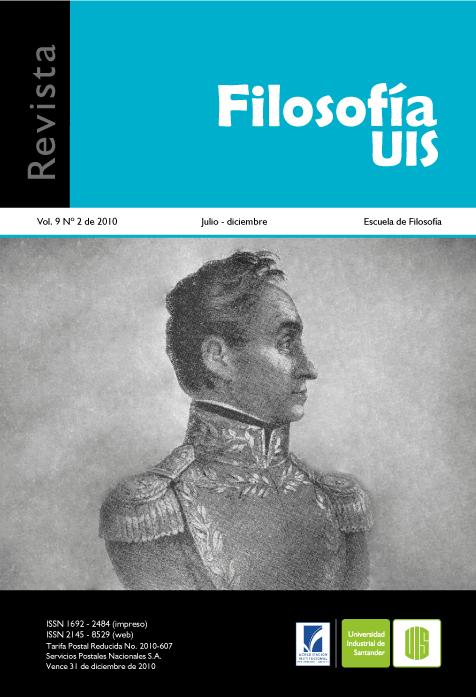Published 2010-12-14
Keywords
- Human,
- religion,
- feeling,
- reason,
- world upside down
How to Cite
Copyright (c) 2010 Freddy Francisco Ortiz Quezada

This work is licensed under a Creative Commons Attribution 4.0 International License.
Abstract
When stablishing the reason as the powerful owner of sense and foundation of all reality: it automatically comes the death of religion, because, of denying sensory experience, being it the foundation of the religious phenomenon. This project was developed by the Western mind during in a time that became decisive for human destiny. The goal this paper is to show, first, how humanity is essentially religious and, secondly, how the western human spirit has attempted to destroy this foundation. In this sense, our pursuit is to reveal how philosophy located between the end of the Middle Ages and early modernt kills the religious phenomenon, being the Cartesian philosophy as being responsible for sending to religion to its his darkest night.
Downloads
References
- Aristóteles (1995). Física. Traducción de Guillermo R. de Echandía, Madrid: Gredos.
- Cappelletti, Ángel (1993). Textos y estudios de filosofía medieval, Mérida: Universidad de los Andes.
- Conrado, Eggers y Victoriae, Julia (1986). Los filósofos presocráticos. Tomo I, Traducción de Conrado, Eggers Lan, Madrid: Gredos.
- Descartes, Rene (1946). Obras completas. Traducción de Manuel Machado, París: Casa editorial Garnier hermanos 6, Rue Des Sainte-Pères, 6.
- Espinel Souares, Anastassia (2009). Aventuras Neolíticas, Bucaramanga: Sistemas y Computadores S.A, SIC, El libro total.
- Heidegger, Martín (1989). Hölderlin y la esencia de la poesía. Traducción de Juan David García Bacca, Barcelona: Anthropos.
- Heidegger, Martín (2003). ¿Qué es metafísica? Traducción de Helena Cortés y Arturo Leyte, Madrid: Alianza.
- Heidegger, Martín (2006). Ser y tiempo. Traducción de Jorge Eduardo Rivera, Madrid: Trotta.
- Kung, Hans (2006). El cristianismo. Traducción de Abelardo Martínez de Lapera, Madrid: Trotta.
- Nietzsche, Friedrich (1996). La genealogía de la moral. Traducción de Andrés Sánchez Pascual, Madrid: Alianza.
- Platón (1992). Los clásicos de Grecia y Roma. Timeo. Traducción de María Ángeles Durán, Madrid: Gredos.
- San Agustín (1993). Confesiones, Barcelona: Altaya.
- Wittgenstein, Ludwig (1988). Investigaciones filosóficas. Traducción castellana de Alfonso García Suárez y Ulises Moulines, Barcelona: Crítica.
- Wittgenstein, Ludwig (2002). Tractatus logico-philosophicus. Traducción castellana de Luis M. Valdés Villanueva, Madrid: Tecnos.
